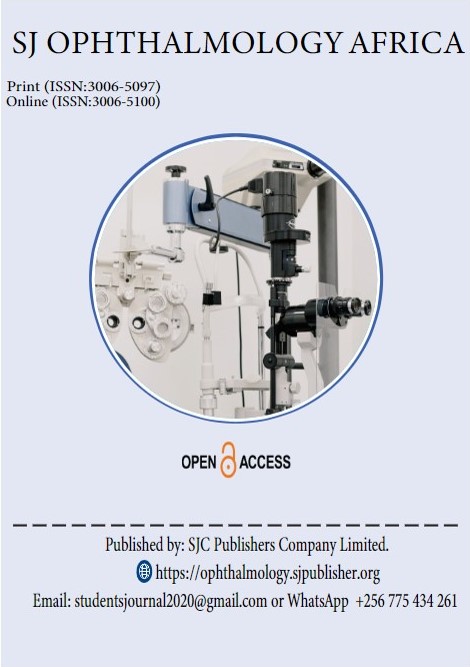PREVALENCE OF OCULAR FOREIGN BODIES AMONG PATIENTS RECEIVING HEALTH CARE SERVICES AT JINJA REGIONAL REFERRAL HOSPITAL EYE CLINIC JINJA, UGANDA. A CROSS-SECTIONAL STUDY.
DOI:
https://doi.org/10.51168/bkrt8x28Keywords:
Ocular Foreign Bodies, Jinja Regional Referral Hospital, Eye ClinicAbstract
Purpose of the study
The purpose of the study was to determine the prevalence of ocular foreign bodies among patients receiving health care services at JRRH to provide a baseline source of data for public education.
Objectives
The general objective was to determine the prevalence of OFBs among patients receiving health care services seen at the eye department of JRRH and the specific objectives were to determine the predisposing causes to OFBs, the possible treatment, and the complications of OFBs among patients receiving health care services at JRRH.
Study methodology
The study adopted a cross-sectional quantitative research design. Simple random sampling methods were used to select respondents who participated in the study and a total of 40 respondents were interviewed. Self-administered questionnaires were used to collect data from the respondents.
Results
During the study, it was found that farming was the most common activity carried out by respondents at the time they sustained ocular foreign body constituting 30% (12/40) of all activities resulting to the vegetative type of foreign body on lead, 55%. The majority of the respondents were from the rural 65% and 35% from urban settings, with the most affected age being 20-25 years.
Conclusions
In JRRH, the prevalence of OFB among patients is high with the majority of the cases being easily treatable with good prognosis.
Recommendation
The study recommends using eye protective gear by people involved in activities where OFBs may traumatize their eyes.
Health education on OFBs should be adopted by the relevant authorities that is the DHECT.
Training of more eye health workers should done by the Government to technically manage OFBs.
Downloads
Published
Issue
Section
License
Copyright (c) 2024 Emmanuel Okiring , Michael Kabasa (Author)

This work is licensed under a Creative Commons Attribution-NonCommercial-NoDerivatives 4.0 International License.

